Abstract
The development of a scale to measure perceived illness experience in young people with cancer is described. Areas of concern were first identified through semistructured interviews conducted with children and adolescents. As a result, 78 items were generated to cover the main areas identified (physical appearance, interference with activity, peer rejection, integration in school, manipulation, parental behaviour, disclosure, preoccupation with illness, and impact of treatment). These items were rated (on five point scales) by 41 patients (mean age 14.6 years) and 35 of their parents. Measures of physical functioning (symptoms, functional disability, and restrictions) and psychological functioning (symptoms) were included for validation purposes. Test-retest reliability was calculated on the basis of ratings made by a subsample of parents on two separate occasions. A 34 item scale was constructed with four items in each of the areas identified above, except for physical appearance (n = 2). The scale has adequate internal reliability and validity. There were significant correlations between parents and their children on all subscales except for illness disclosure and impact of treatment, suggesting that parents may be less reliable informants for their children in these contexts. The scale has potential use in clinical contexts, in evaluating the psychosocial impact of different treatment regimens, and as an outcome measure in intervention work.
Full text
PDF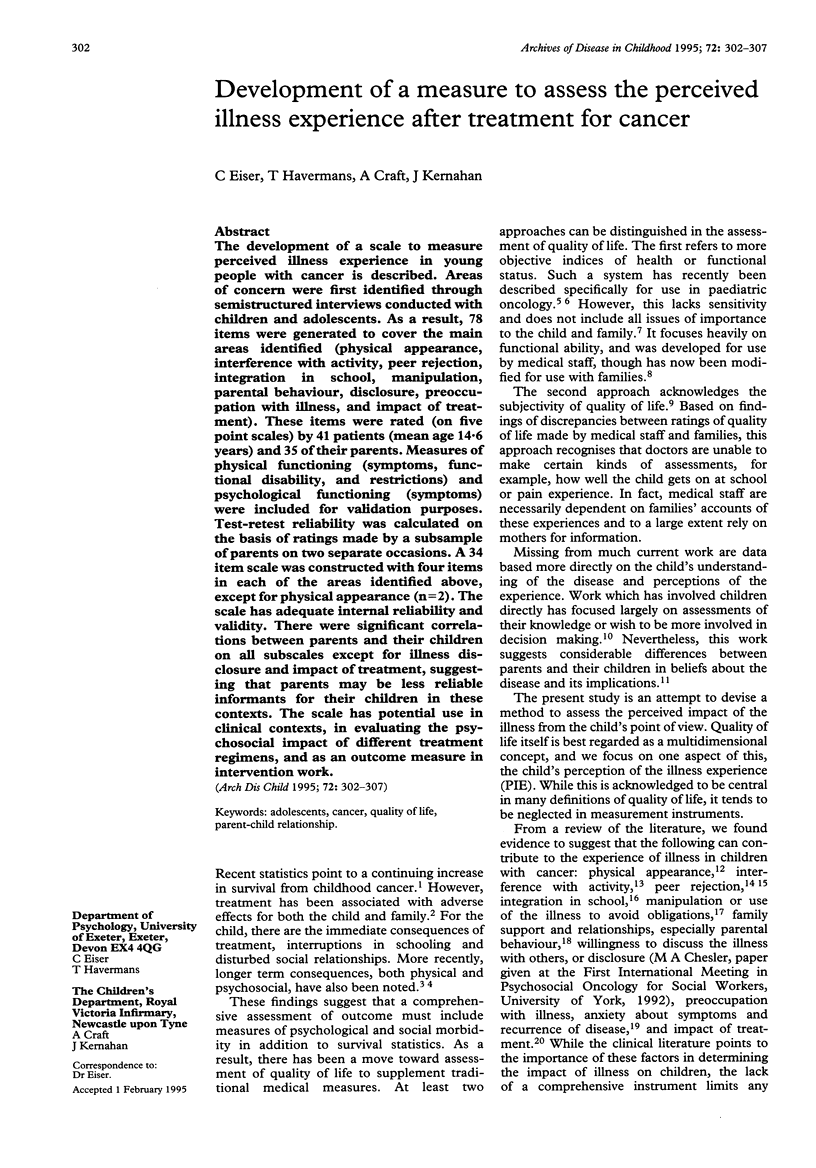
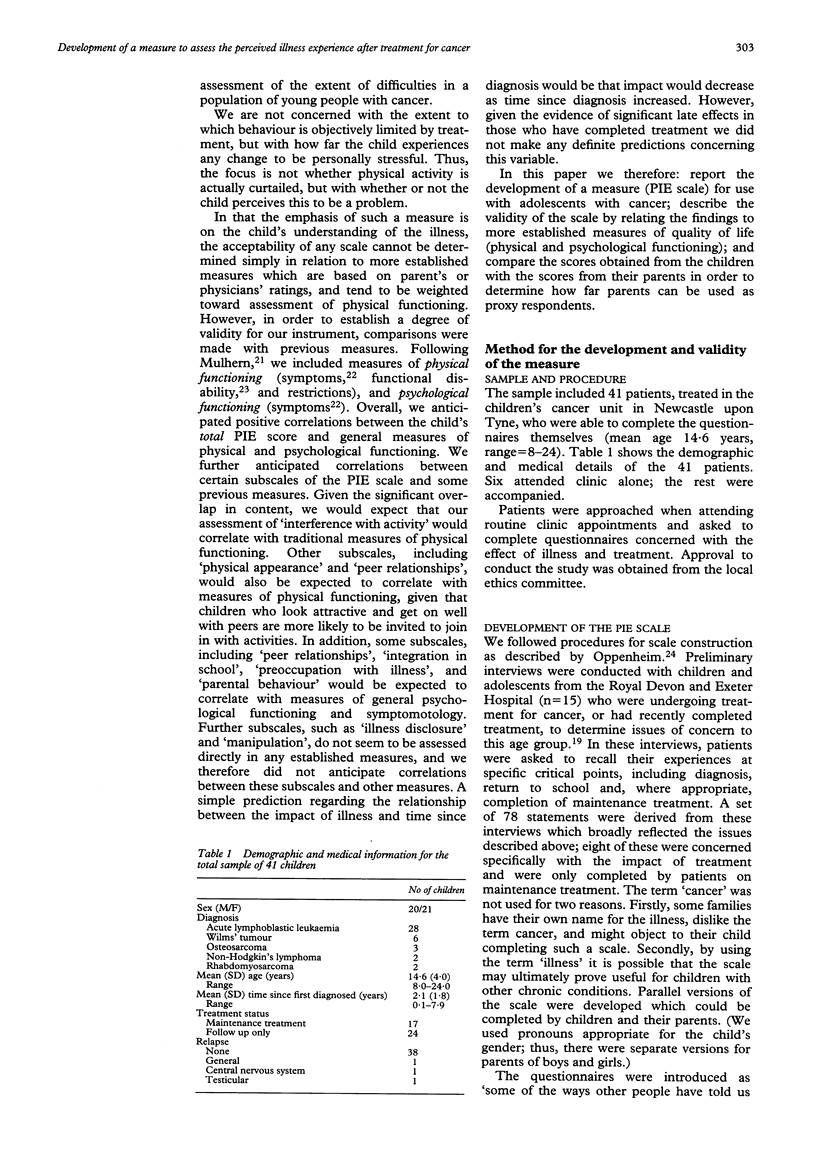
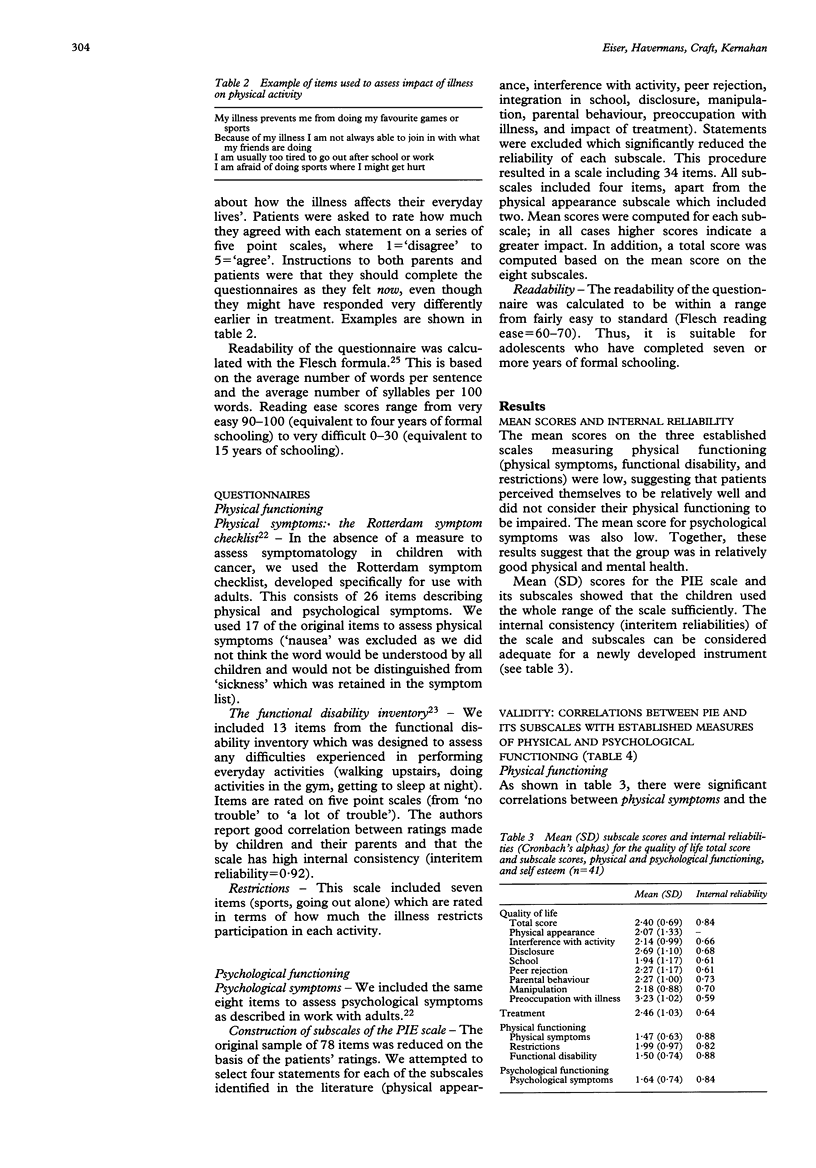
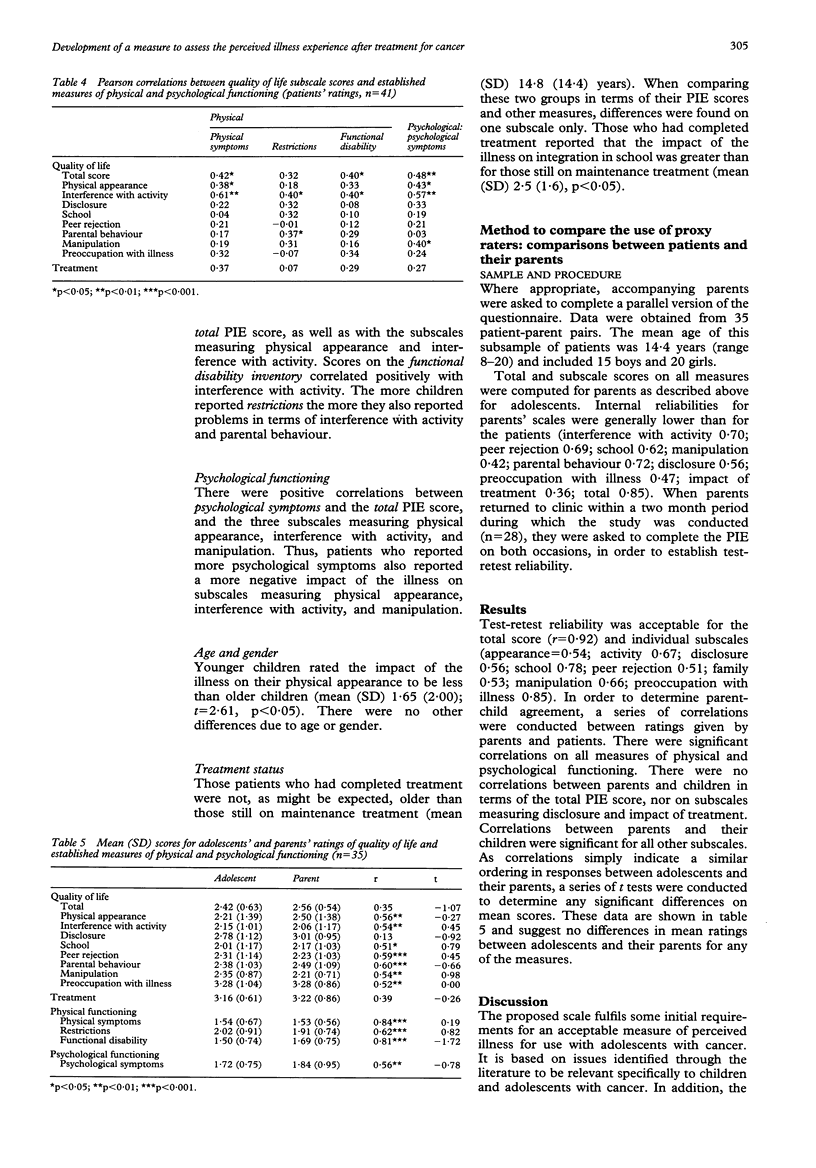
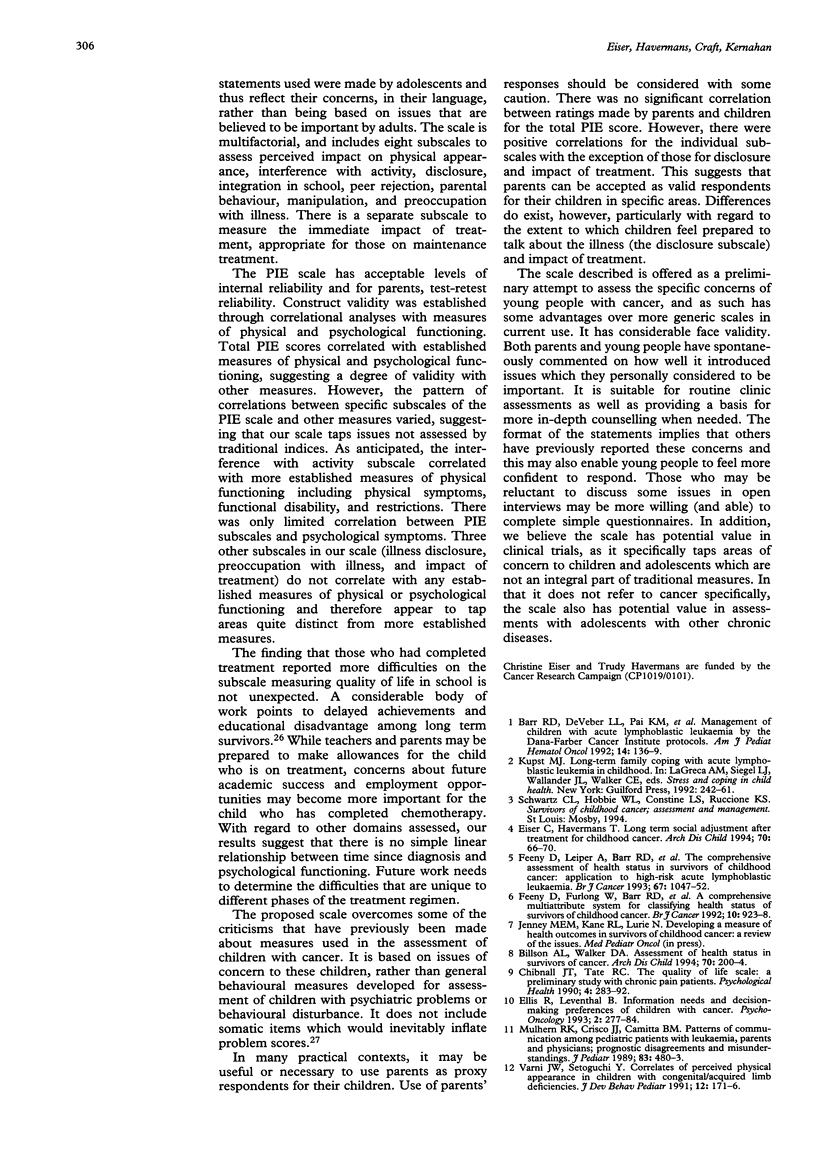
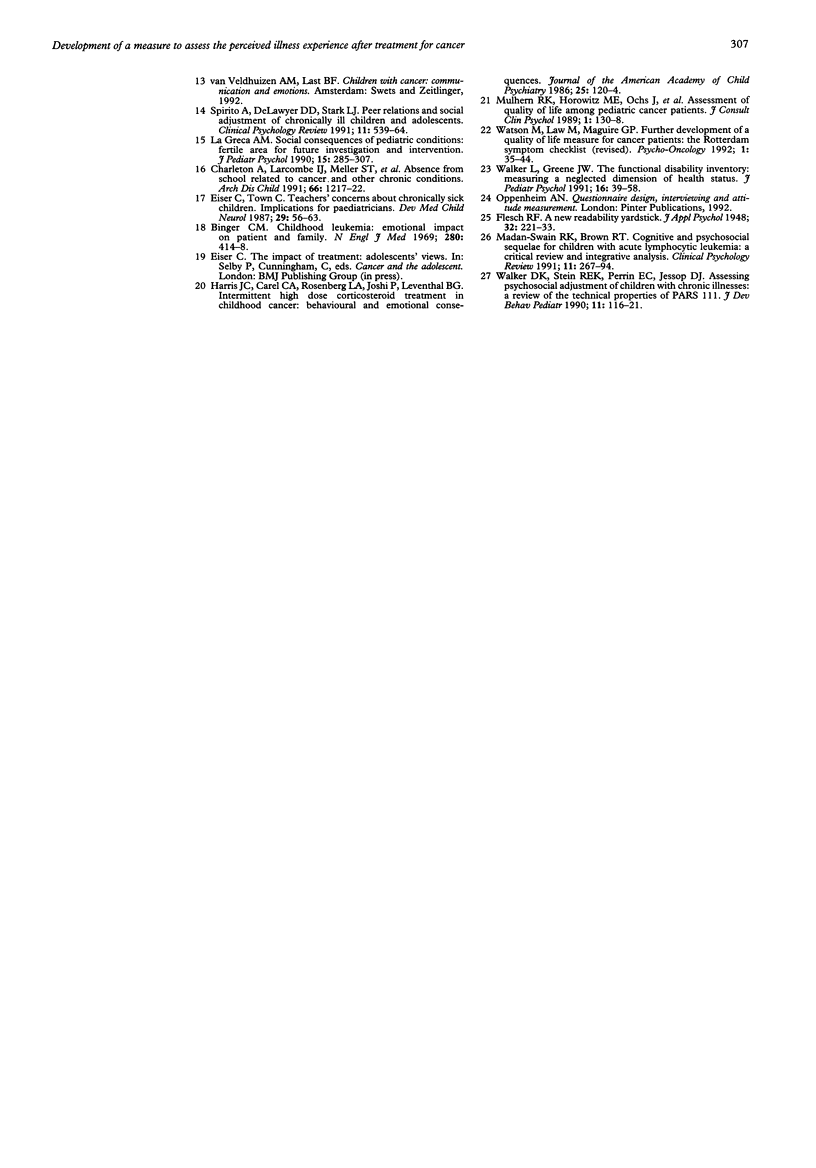
Selected References
These references are in PubMed. This may not be the complete list of references from this article.
- Barr R. D., DeVeber L. L., Pai K. M., Andrew M., Halton J., Cairney A. E., Whitton A. C. Management of children with acute lymphoblastic leukemia by the Dana-Farber Cancer Institute protocols. An update of the Ontario experience. Am J Pediatr Hematol Oncol. 1992 May;14(2):136–139. doi: 10.1097/00043426-199205000-00007. [DOI] [PubMed] [Google Scholar]
- Billson A. L., Walker D. A. Assessment of health status in survivors of cancer. Arch Dis Child. 1994 Mar;70(3):200–204. doi: 10.1136/adc.70.3.200. [DOI] [PMC free article] [PubMed] [Google Scholar]
- Binger C. M., Ablin A. R., Feuerstein R. C., Kushner J. H., Zoger S., Mikkelsen C. Childhood leukemia. Emotional impact on patient and family. N Engl J Med. 1969 Feb 20;280(8):414–418. doi: 10.1056/NEJM196902202800804. [DOI] [PubMed] [Google Scholar]
- Charlton A., Larcombe I. J., Meller S. T., Morris Jones P. H., Mott M. G., Potton M. W., Tranmer M. D., Walker J. J. Absence from school related to cancer and other chronic conditions. Arch Dis Child. 1991 Oct;66(10):1217–1222. doi: 10.1136/adc.66.10.1217. [DOI] [PMC free article] [PubMed] [Google Scholar]
- Eiser C., Havermans T. Long term social adjustment after treatment for childhood cancer. Arch Dis Child. 1994 Jan;70(1):66–70. doi: 10.1136/adc.70.1.66. [DOI] [PMC free article] [PubMed] [Google Scholar]
- Eiser C., Town C. Teachers' concerns about chronically sick children: implications for paediatricians. Dev Med Child Neurol. 1987 Feb;29(1):56–63. doi: 10.1111/j.1469-8749.1987.tb02107.x. [DOI] [PubMed] [Google Scholar]
- Feeny D., Furlong W., Barr R. D., Torrance G. W., Rosenbaum P., Weitzman S. A comprehensive multiattribute system for classifying the health status of survivors of childhood cancer. J Clin Oncol. 1992 Jun;10(6):923–928. doi: 10.1200/JCO.1992.10.6.923. [DOI] [PubMed] [Google Scholar]
- Feeny D., Leiper A., Barr R. D., Furlong W., Torrance G. W., Rosenbaum P., Weitzman S. The comprehensive assessment of health status in survivors of childhood cancer: application to high-risk acute lymphoblastic leukaemia. Br J Cancer. 1993 May;67(5):1047–1052. doi: 10.1038/bjc.1993.192. [DOI] [PMC free article] [PubMed] [Google Scholar]
- Harris J. C., Carel C. A., Rosenberg L. A., Joshi P., Leventhal B. G. Intermittent high dose corticosteroid treatment in childhood cancer: behavioral and emotional consequences. J Am Acad Child Psychiatry. 1986 Jan;25(1):120–124. doi: 10.1016/s0002-7138(09)60608-7. [DOI] [PubMed] [Google Scholar]
- La Greca A. M. Social consequences of pediatric conditions: fertile area for future investigation and intervention. J Pediatr Psychol. 1990 Jun;15(3):285–307. doi: 10.1093/jpepsy/15.3.285. [DOI] [PubMed] [Google Scholar]
- Walker L. S., Greene J. W. The functional disability inventory: measuring a neglected dimension of child health status. J Pediatr Psychol. 1991 Feb;16(1):39–58. doi: 10.1093/jpepsy/16.1.39. [DOI] [PubMed] [Google Scholar]


